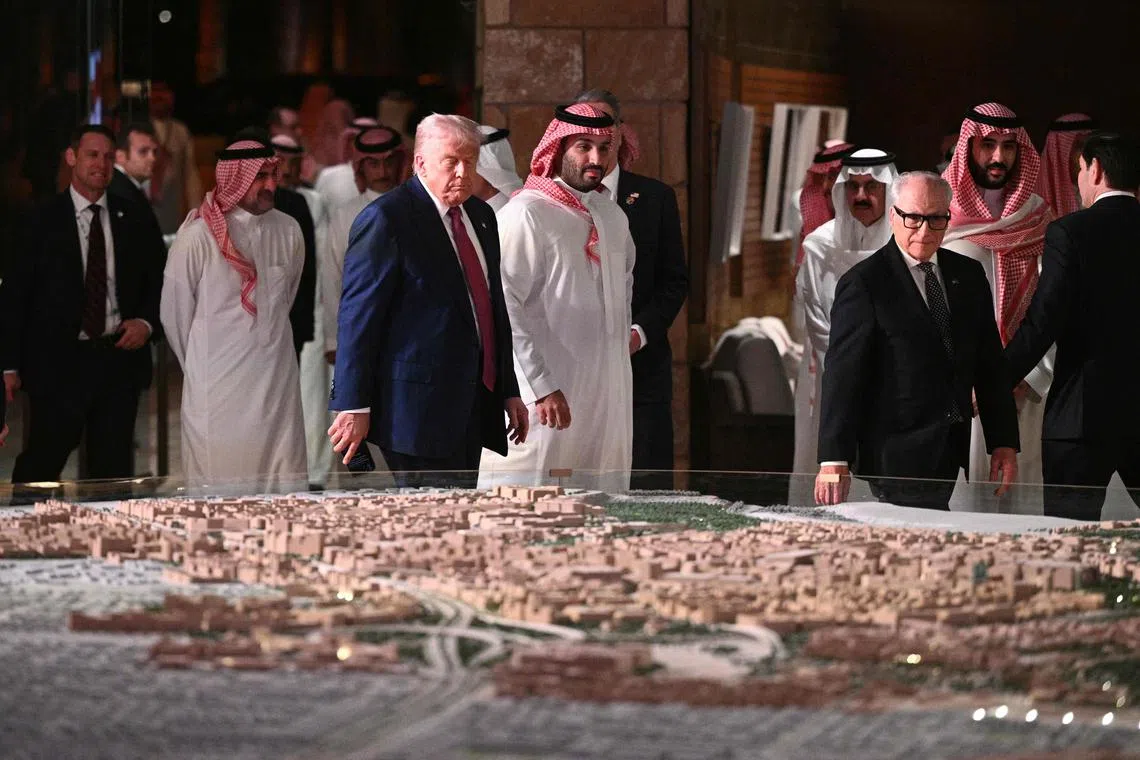News analysis
Trump puts deal-making over rights in Saudi Arabia policy speech
Sign up now: Get ST's newsletters delivered to your inbox

US President Donald Trump and Saudi Crown Prince Mohammed bin Salman visit the old district of Diriyah on the outskirts of the Saudi capital Riyadh on May 13.
PHOTO: AFP
WASHINGTON - US President Donald Trump sent a message to the world in Saudi Arabia on May 13: Make business deals and the US will not meddle in your affairs.
Mr Trump praised the country’s leadership for its modernisation push and said Iran, Lebanon and Syria all had the opportunity for a brighter future. The Middle East would be “defined by commerce, not chaos,” he said.
Fulfilling the wishes of many of his Maga (Make America Great Again) base, he rejected notions of nation-building and pressure on human rights that other US presidents once championed. Of Crown Prince Mohammed bin Salman, Mr Trump said: “I like him a lot – I like him too much.”
While Mr Trump has signalled that world view starting in his first term, the speech on May 13 laid out his vision in the clearest terms yet after campaign promises to end “forever wars” like the conflicts in Iraq and Afghanistan.
“The so-called nation builders wrecked far more nations than they built and the interventionists were intervening in complex societies that they did not even understand themselves,” he said.
“In recent years, far too many American presidents have been afflicted with the notion that it’s our job to look into the souls of foreign leaders and use US policy to dispense justice for their sins.”
It fit with his broader willingness – staked out during his first term as well – to deepen relationships with leaders and political movements past US leaders had been more wary of, such as a closer partnership with El Salvador’s Nayib Bukele.
The speech also underscores how Mr Trump has flipped the script on the traditional US approach. While he is de-emphasising rights in nations like Saudi Arabia, Iran or Syria, his administration has criticised traditional ally Germany over its treatment of the far-right Alternative for Germany party, and accepted white Afrikaners from another partner, South Africa, over what he has called a “genocide” of farmers there.
“I think what’s iconoclastic about Trump is that he doesn’t really even pay lip service to these ideals in general,” said Mr Stephen Pomper, chief of policy at the International Crisis Group and a National Security Council official under former president Barack Obama. “He’s waved them away.”
Successive administrations have wrestled with the role of Saudi Arabia and other Middle East nations with poor human rights records. Among them was former president Joe Biden, who backtracked from his characterisation of Crown Prince Salman as a “pariah” for the killing of Washington Post columnist Jamal Khashoggi at the Saudi consulate in Istanbul.
Mr Biden later abandoned his early administration view that the defining battle of the world was one of democracies versus autocracies. Mr Trump’s team has taken that a step farther, slashing foreign aid and proposing a State Department revamp that would downgrade the office that oversees democracy and human rights.
“President Trump is a peacemaker, he’s a dealmaker and he’s constantly putting Americans first,” State Department deputy spokesman Tommy Pigott said in response to questions about Mr Trump’s approach. “When we approach foreign policy and the standards, we’re approaching that American First perspective that allows opportunities to pursue common interests.”
In Saudi Arabia, Mr Trump praised the nation’s leadership for its modernisation of the country. He cited the Saudi construction of one of the world’s tallest skyscrapers in Jeddah, juxtaposing it with the economic crisis in Iran.
He promised to lift sanctions against Syria now that President Bashar al-Assad has been toppled and was set to meet Syria’s new leader, Mr Ahmed al-Sharaa, despite Mr Sharaa’s past as an al-Qaeda-affiliated commander and the presence of extreme Islamists among his followers. That gained favour from some Democrats.
“We have a real opportunity I think in Syria,” Senator Jeanne Shaheen of New Hampshire told reporters in Washington. “It’s important for us to provide the opportunity to keep those countries moving in a way that continues to keep out Iran and Russia.”
It all amounts to a clear message to other nations in the Middle East: They can have a brighter future if they partner the US on trade and investment, and the US will not hold past actions against them. The White House on May 13 said it had received investment commitments of US$600 billion (S$781 billion) from Saudi Arabia.
“I am willing to end past conflicts and forge new partnerships for a better and more stable world, even if our differences may be profound,” Mr Trump said. BLOOMBERG


